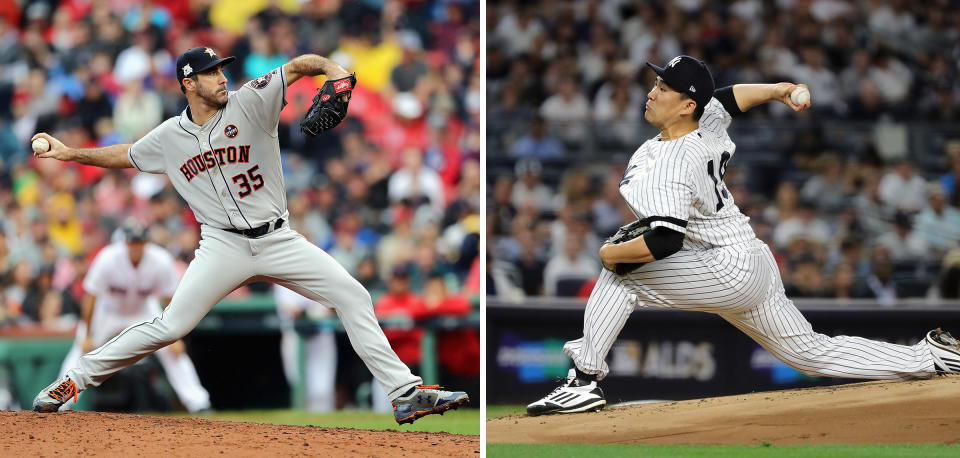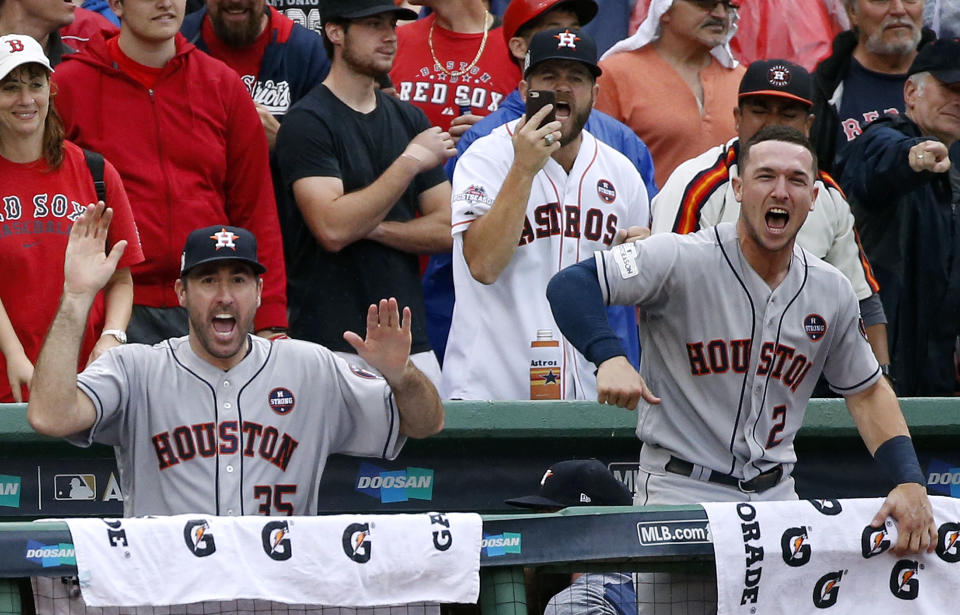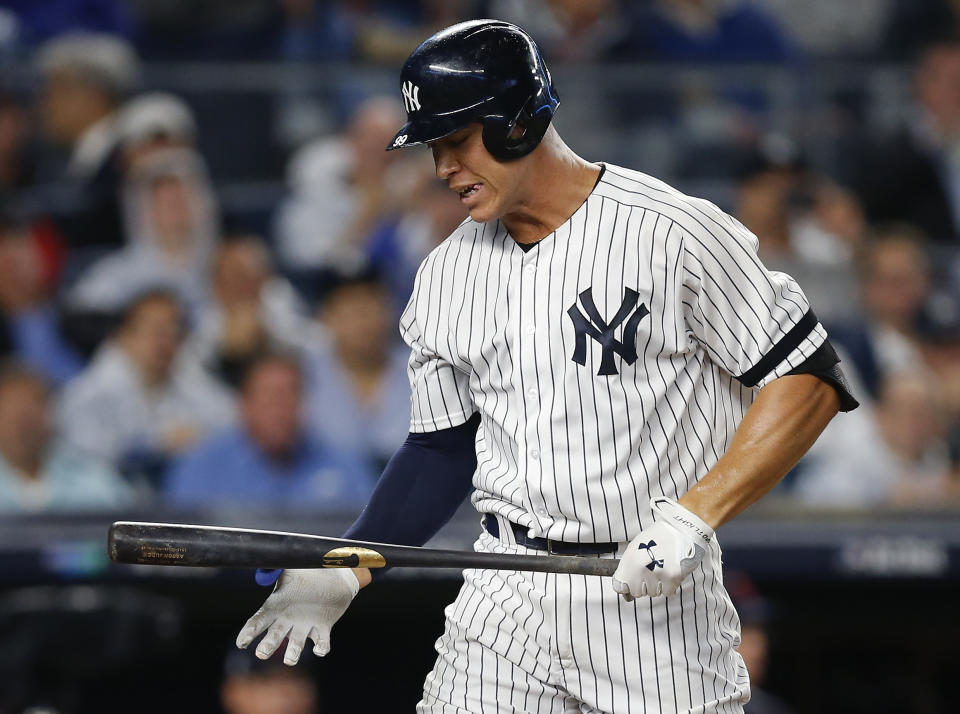ALCS preview: Yankees vs. Astros is not the David vs. Goliath you might think
This American League Championship Series between the Houston Astros and New York Yankees looks like another David vs. Goliath on the surface. There’s the Yankees and their 27 World Series compared to the Astros getting to the World Series once.
There’s the payroll: The Yankees are No. 2 in MLB, paying $224 million this year while the Astros are slightly below league average at $149 million. And there’s the men on the field. The Yankees’ most valuable player this season was 6-foot-7 Aaron Judge while the Astros’ was 5-foot-6 Jose Altuve.
But what if we told you the Astros are really Goliath here? Houston, young and loaded with talent, is the team that’s supposed to be here at after winning 101 games and the AL West title. Houston came into the season with World Series hype and is now one win away. Houston is the team that traded for Justin Verlander at the deadline. The Yankees, meanwhile, are an overachieving team that was supposed to be rebuilding, that won a surprising 91 games, that got into the wild-card game, won that, then knocked off the AL’s best team, the Cleveland Indians. Now, these young Yanks are commanding everyone’s attention.
So we’ve got what looks like a fascinating series — between the Judge vs. Altuve subplot, the Yankees’ dominant bullpen vs. Houston’s potent offense and great young stars on each side, including Carlos Correa, George Springer, Luis Severino and Gary Sanchez.
SCHEDULE
Game 1: 8 p.m. ET, Friday at Minute Maid Park (Fox Sports 1)
Game 2: 4 p.m. ET, Saturday at Minute Maid Park (Fox)
Game 3: 8 p.m. ET, Monday at Yankee Stadium (FS1)
Game 4: Time TBA, Tuesday at Yankee Stadium (Fox or FS1)
Game 5*: Time TBA, Wednesday at Yankee Stadium (Fox or FS1)
Game 6*: Time TBA, Friday, Oct. 20 at Minute Maid Park (Fox or FS1)
Game 7*: Time TBA, Saturday, Oct. 21 at Minute Maid Park (Fox or FS1)
*if necessary
PREVIOUSLY
The Astros and Yankees haven’t met since July 2 and a lot has changed since then on both sides. Both teams were active as mid-season traders, with the Astros bringing over Verlander in August and the Yankees adding Todd Frazier, Sonny Gray, David Robertson and others at the trade deadline.
All that is to say, you can’t put a ton of stock in the “previously” between these two teams. The Astros won the season series 5-2, including a four-game series in New York in May where they were 3-1. The other two wins came in a late June/early July when the Astros got the better of a three-game series at Minute Maid Park. The run differential was still pretty close too, as the Astros scored 43 in the seven games and the Yankees scored 41. Oh, and keep this in mind: The Indians five of seven against the Yankees this year too. We see how that worked out.
Another interesting subplot that sort of fits here: Two Astros vets, Carlos Beltran and Brian McCann, both previously played for the Yankees, as recently as last season. You have to wonder if that will help the Astros.

PITCHING
Game 1: Dallas Keuchel (14-5, 2.90 ERA) vs. Masahiro Tanaka (13-12, 4.74 ERA)
Game 2: Justin Verlander (15-8, 3.36 ERA) vs. Luis Severino (14-6, 2.98 ERA)
Game 3: Charlie Morton (14-7, 3.62 ERA) vs. CC Sabathia (14-5, 3.69 ERA)
Game 4: TBD vs. TBD
Game 5*: TBD vs. TBD
Game 6*: TBD vs. TBD
Game 7*: TBD vs. TBD
*if necessary
If not for a few injuries that limited his innings, Dallas Keuchel may have found himself in the Cy Young race again. He got back to his extreme groundball tendencies in 2017, putting up a 66.8 percent groundball rate, which was the best in the majors. That formula works when you induce weak contact, and Keuchel did a lot of that this year.
Behind him, Justin Verlander is one of the more overqualified No. 2 starters. He thrived with Houston, upping his strikeout rate to 35.8 percent and just stopped walking people. Sure, it was only five starts, but his peripherals have never looked better.
The team will have to decide where to go from there. Brad Peacock and Charlie Morton each got starts in the ALDS, though Peacock was on a short leash. Lance McCullers Jr. was used out of the bullpen after being used strictly as a starter during the regular season. A.J. Hinch has some decisions to make.
Luis Severino became an ace in 2017, but the Yankees rotation doesn’t have a No. 2 on par with Keuchel or Verlander. They do have experience, however. Morton and Peacock had strong years, but the combination of Sonny Gray, Masahiro Tanaka and CC Sabathia have longer and better track records.
Tanaka gets the call for Game 1. He had a rough first half, but got things under control in the second half and is coming off an exceptional start in the ALDS. He’ll be followed by Luis Severino, whose poor performance in the AL wild-card game looks like an outlier compared to the rest of his season. He’s the least experienced pitcher in the group, but he’s the team’s ace.
Sabathia will get the nod for Game 3 coming off a strong bounce-back year. While manager Joe Girardi hasn’t revealed the rest of his rotation yet, you would assume Gray would go Game 4, and then the final three starters could get juggled around depending on how well the Yankees have fared in the series.

THREE KEYS FOR ASTROS
Keep the balance: Nine different players drove in at least one run for the Astros during the ALDS. That highlights the depth and danger of a lineup that still might not be clicking on all cylinders. They’ll need to maintain that balance against a resilient Yankees team that just held Francisco Lindor and Jose Ramirez to a combined 4-for-38 in the ALDS and overall did a great job slowing down Cleveland’s offense. If the Astros end up relying on one or two guy, the same could happen to them.
Defend the home field: The Astros set the tone in the ALDS, winning Games 1 and 2 at Minute Maid Park by a combined score of 16-4 against Boston. The actual scores don’t matter so much, but it feels like Houston would be well served to take control and force the Yankees into battle-back mode again. Even though New York has excelled in that role this postseason, the urgency and energy expended is bound to catch up eventually.
Bullpen improvement: Houston’s biggest weakness was exposed somewhat during the ALDS. Their relievers combined to allow nine runs over 13 2/3 innings. The bulk of that damage came during Game 3, when Boston ran away in the late innings. Nonetheless, A.J. Hinch figures to lean on his bullpen in at least two games during the ALCS, and perhaps more if either Justin Verlander or Dallas Keuchel falter. If the relievers don’t answer the call, Houston could have a problem.

THREE KEYS FOR YANKEES
Get Aaron Judge going: The Yankees won the ALDS despite Aaron Judge finishing with one hit and a postseason record 16 strikeouts in five games. They will not win the ALCS if Judge comes anywhere close to repeating that. In fact, they’ll probably need a big series from Judge in what could be an offensive-minded series. Even if the long balls don’t come, the Yankees need Judge to put in good at-bats and keep the lineup moving rather than stalling at his spot.
Make the Astros play catch up: As the Red Sox learned in the ALDS, you can’t win when you don’t lead. The Astros took control of all four games by scoring first. And though the Red Sox were able to battle back and win one of those games, the odds were stacked against them doing it three times. Houston can score from anywhere in the order too, which means no lead against them is safe, and any deficit can become insurmountable quickly.
Ride the bullpen: While Houston’s bullpen struggled, New York’s carried them through some key moments in the ALDS. Yes, Game 2 blew up on Francisco Lindor’s grand slam against the Chad Green, but even that followed the controversial non-challenge. Aroldis Chapman, David Robertson, Dellin Betances and Tommy Kahnle combined to allow two earned runs over 21 2/3 innings. If those guys stay hot, we’ll have a series.
FIVE KEY NUMBERS
• 17.3: The rate at which the Astros offense struck out this season. That figure was the lowest in the league. By wRC+, the Astros had the best offense in baseball all season. Strikeout rate will be huge, as Yankees’ pitchers were fourth in the league with a 25.7 strikeout rate.
• 36.8: The Yankees fly-ball rate in 2017. It should come as no surprise that a team capable of mashing home runs at a ridiculous rate ranked eighth in the league in fly-ball rate. That will be a key against Keuchel, who posted the league’s best ground-ball rate this season.
• 6: Combined plate appearances for Aaron Judge and Gary Sanchez against Keuchel and Verlander. The duo has never faced Verlander, somehow. They are hitless against Keuchel in six appearances. Whichever side does their homework could wind up with an advantage here.
• 1,315: Combined strikeouts from both bullpens on the year. The Astros’ relievers actually struck out more hitters than the Yankees’ reliever, though it was close (662 to 653). Those were the top two rates in the league. Things could get rough for hitters when both teams turn things over to the pen.
• 1.41: Keuchel’s career ERA vs. the Yankees in 44.2 innings. And that doesn’t include the six shutout inning he threw against them in the 2015 AL wild-card game.
More MLB coverage from Yahoo Sports:
– – – – – –
Mike Oz is the editor of Big League Stew on Yahoo Sports. Have a tip? Email him at mikeozstew@yahoo.com or follow him on Twitter! Follow @MikeOz


